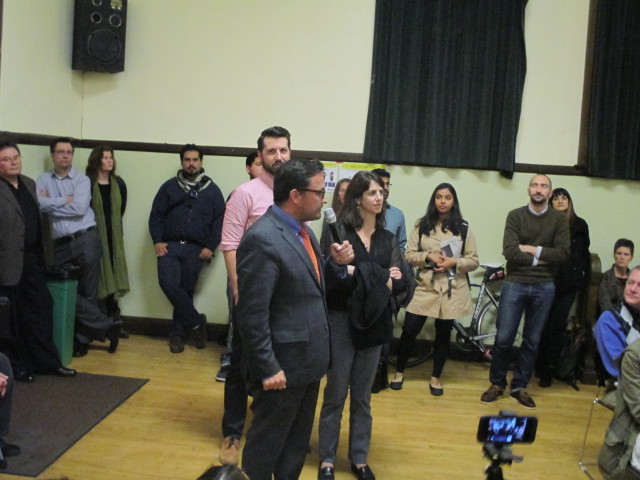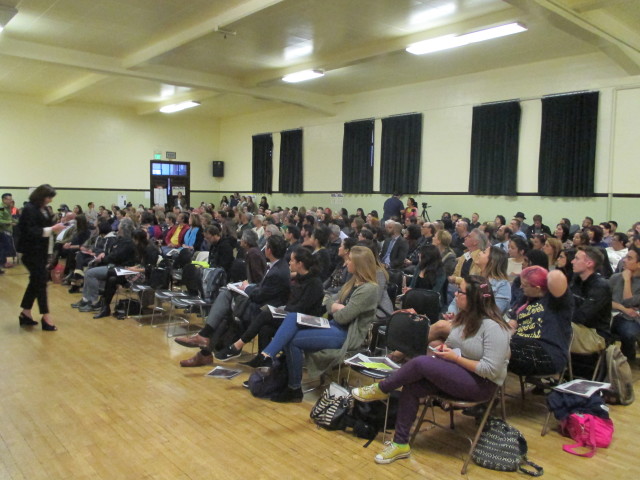Large crowd at the Chron’s Mission Forum makes it clear that protecting existing residents and businesses is the top priority — and that might mean a temporary halt to development

FEBRUARY 25, 2015 — The Chron held its much-publicized forum on the future of the Mission last night, and the response from the audience suggested there will be a lot of support for a move to limit new development in the neighborhood.
The room was packed, with hundreds of people watching the Chron’s 20-minute video on the changes in the Mission and then hearing a panel talk about some of the issues. I can complain about the Chron coverage — at no point did any reporter confront a greedy landlord or speculator on camera and ask how they feel about destroying a community. The disaster of displacement in the Mission seemed almost like an act of God — it just happens, and there are no bad guys.
But at least the paper is talking about displacement, and while there were a few really lame people on the panel, there were also some very good people speaking. Erick Arguello, the president of Calle24, set the tone for the discussion when he said that the goal of his group is to “make sure our people are able to stay.”

There was the usual talk about whether market-rate housing causes displacement (it does) or helps prevent it (never happens). Fernando Marti, co-director of the Council of Community Housing Organizations, pointed out that the only real effective planning efforts in the eastern part of town have come when there has been a short-term moratorium on development.
Luis Granados, executive director of the Mission Economic Development Agency, showed a chart demonstrating how lower-income people are disappearing from the Mission.
And Arguella, Marti, and Granados all agreed: What we are doing now – letting the private market determine housing in the Mission – isn’t working. It’s a crisis, and something dramatic has to change.
Joe Garofoli, one of the Chron reporters on the project, asked a good question: What would success look like? Marti had the clear and obvious answer:
“Success is when not a single person gets evicted, there’s no more speculation, and we build housing in balance with job growth.”
Everyone applauded – because to most of the people who showed up for the event, Marti articulated the issue that has to be at the center of any debate: People who live in the neighborhood now, and don’t want to leave, shouldn’t be forced out to make room for people with more money.
Simple concept. Everyone in the room seemed to get it. Amazingly hard to get across at City Hall sometimes.
District Nine Supervisor David Campos was offered the chance to address the panel, and he talked about the Calle24 proposals. He noted that he’s been criticized for calling for a moratorium on development when he hasn’t even introduced a bill yet.
But the “key assumption by the attackers,” he said, is that supply-side economics, Ronald Reagan’s theory, actually works. “You build luxury homes, and somehow that will trickle down … it’s voodoo housing, the idea that you can have affordable housing even if you don’t build affordable housing.”
I have no problem with the legislation Sup. Scott Wiener is introducing to place some limits on monster homes. They’re a big issue in Corona Heights, which is Wiener’s district (and he lives there). All he’s asking for is a conditional use hearing for anything more than 3,000 square feet, and he’s only asking to put those rules in place for 18 months while city planners study the issue.
This is how district supervisors respond to community issues, and I imagine he will get support from most of his colleagues.
My question: Why is that any different from Mission community leaders and Campos promoting controls on inappropriate development in the Mission?
Size is one factor in protecting and preserving neighborhood character. So is the actual type of development. I know this pushes a lot of buttons, but the truth is, some low-income communities can’t keep absorbing luxury housing without seriously damaging the existing residents and businesses.
High-end housing leads to displacement. That’s a fact, proven over the years. You put a bunch of million-dollar condos near 24th Street, and it will drive up property values nearby, and community-serving businesses will be forced out and replaced with fancy restaurants. Evictions will increase as landlords try to cash in.
We have seen this pattern dozens of times all over the city. In the 1990s, as Wiener (a supporter of nightlife) clearly remembers, the city allowed market-rate housing to be built near South of Market clubs. And instantly, there were issues: The rich people in the new condos were mad that the clubs were noisy at night.
Inappropriate mix: You don’t put rich people who are going to complain about noise next to live-music venues.
And maybe you don’t put more rich people in a neighborhood where that kind of development even further pushes up land values and leads to more displacement.
I asked Wiener about the contradiction, and he said:
“It’s totally different. Turning a regular-size home into a monster home isn’t adding new housing. My objection to the proposed Mission moratorium is that it will reduce housing creation.”
Yes, it will. He’s right. I agree. But the pattern of market-rate housing sales in the city suggests that none of the housing creation we are doing now will help the crisis, and will probably make it worse.
There seems to be a bit of confusion about the role Campos is playing in the proposed development for the 16th Street BART station. The developer made a mistake and included him as a sponsor of a March 4 meeting. The likes of Michael Petrelis are demanding that he take a stand.
All of this shows a deep misunderstanding of how the Board of Supervisors works.
There’s no doubt in my mind that whatever the Planning Commission decides on the Maximus development, it will wind up getting appealed to the supes. That’s typical with big projects that require environmental review and conditional-use authorization.
When that happens, the board members are sitting in a quasi-judicial role, hearing an appeal of another city agency’s ruling. If any member has already taken a position for or against the project, he or she can be forced to accept recusal and sit it out.
This project will be controversial, and the vote on the board could be close. Campos would be highly irresponsible to take a position for or against the project today when that could jeopardize his vote on it later, when it matters.







